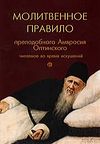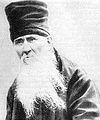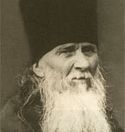 Holy Apostle Philip of the Seventy, one of the seven deacons (1st c.). Commemoration of the Holy Fathers of the Seventh Ecumenical Council (787).
Holy Apostle Philip of the Seventy, one of the seven deacons (1st c.). Commemoration of the Holy Fathers of the Seventh Ecumenical Council (787).  St. Theophanes Graptus (“the Branded”), confessor and hymnographer, bishop of Nicaea (850). Synaxis of the Elders of Optina: Sts. Leonid (repose) (1841), Macarius (1860), Moses (1862), Anthony (1865), Hilarion (1873), Ambrose (1891), Anatole I (1894), Isaac I (1894), Joseph (1911), Barsanuphius (1913), Anatole II (1922), Nektary (1928), New Hiero-confessor Nikon (1931), and New Hieromartyr Archimandrite Isaac II (1937).
St. Theophanes Graptus (“the Branded”), confessor and hymnographer, bishop of Nicaea (850). Synaxis of the Elders of Optina: Sts. Leonid (repose) (1841), Macarius (1860), Moses (1862), Anthony (1865), Hilarion (1873), Ambrose (1891), Anatole I (1894), Isaac I (1894), Joseph (1911), Barsanuphius (1913), Anatole II (1922), Nektary (1928), New Hiero-confessor Nikon (1931), and New Hieromartyr Archimandrite Isaac II (1937).
Martyrs Zenaida (Zenais) and Philonilla, of Tarsus in Cilicia (1st c.). St. Theophanes, faster, of the Kiev Caves (12th c.).
New Hieromartyr Juvenal (Maslovsky), archbishop of Ryazan and Shatzk (1937).
Sts. Nectarius (397), Arsacius (405), and Sinisius (427), archbishops of Constantinople. St. Cainnech (Kenneth), abbot, of Aghaboe (Ireland), and missionary in Scotland (600). St. Ethelburga, foundress of the monastery of Barking (England) (ca. 676). St. Gommar, patron of Lier (Neth.) (775). Commemoration of the Miracle from the Icon of Our Lord Jesus Christ in Beirut of Phoenicia (7th c.). St. Sabbas, fool-for- Christ, of Vatopedi, Mt. Athos (1349). St. Philotheus (Kokkinos) of Mt. Athos, patriarch of Constantinople (1379).
Twentieth Sunday After Pentecost. [Gal. 1:11-19; Luke
7:11-16]
The Lord sees a mother weeping over the
death of her son and has compassion on her; another time
he was called to a marriage, and rejoiced together with
the family. By this He showed that to share ordinary
everyday joys and sorrows is not contrary to His spirit.
This is what true, reverent Christians do, who live their
life in fear [of God]. However, they distinguish some
everyday life routines from others; for much has entered
into these routines which cannot be God’s good will.
There are customs that come from passions, which arise for
their indulgence; others are kept alive by vanity and
busyness. He who has the spirit of Christ, will be able to
distinguish the good from the bad: he adheres to the one
and rejects the other. He who does this with the fear of
God is not alienated by others, though he does not act
like them, because he always acts in the spirit of love
and compassion toward the infirmities of his brothers.
Only a spirit of zeal beyond measure rubs people the wrong
way and produces disharmony and division. Such a spirit
cannot refrain from teaching and criticizing. But the [one
with the spirit of Christ] is only concerned with ordering
his and his family’s life in a Christian way; he
does not permit himself to interfere in the affairs of
others, saying to himself, “Who set me as a
judge?” He quietly makes everyone well disposed to
himself, and inspires respect for those routines to which
he holds. A supervisor makes himself unloved, and evokes
disapproval for the good routines to which he holds.
Humility in such cases is needed—Christian humility.
It is the source of Christian good sense, which knows how
to act well in a given situation.


![]() Holy Apostle Philip of the Seventy, one of the seven deacons (1st c.). Commemoration of the Holy Fathers of the Seventh Ecumenical Council (787).
Holy Apostle Philip of the Seventy, one of the seven deacons (1st c.). Commemoration of the Holy Fathers of the Seventh Ecumenical Council (787). ![]() St. Theophanes Graptus (“the Branded”), confessor and hymnographer, bishop of Nicaea (850). Synaxis of the Elders of Optina: Sts. Leonid (repose) (1841), Macarius (1860), Moses (1862), Anthony (1865), Hilarion (1873), Ambrose (1891), Anatole I (1894), Isaac I (1894), Joseph (1911), Barsanuphius (1913), Anatole II (1922), Nektary (1928), New Hiero-confessor Nikon (1931), and New Hieromartyr Archimandrite Isaac II (1937).
St. Theophanes Graptus (“the Branded”), confessor and hymnographer, bishop of Nicaea (850). Synaxis of the Elders of Optina: Sts. Leonid (repose) (1841), Macarius (1860), Moses (1862), Anthony (1865), Hilarion (1873), Ambrose (1891), Anatole I (1894), Isaac I (1894), Joseph (1911), Barsanuphius (1913), Anatole II (1922), Nektary (1928), New Hiero-confessor Nikon (1931), and New Hieromartyr Archimandrite Isaac II (1937). 

































